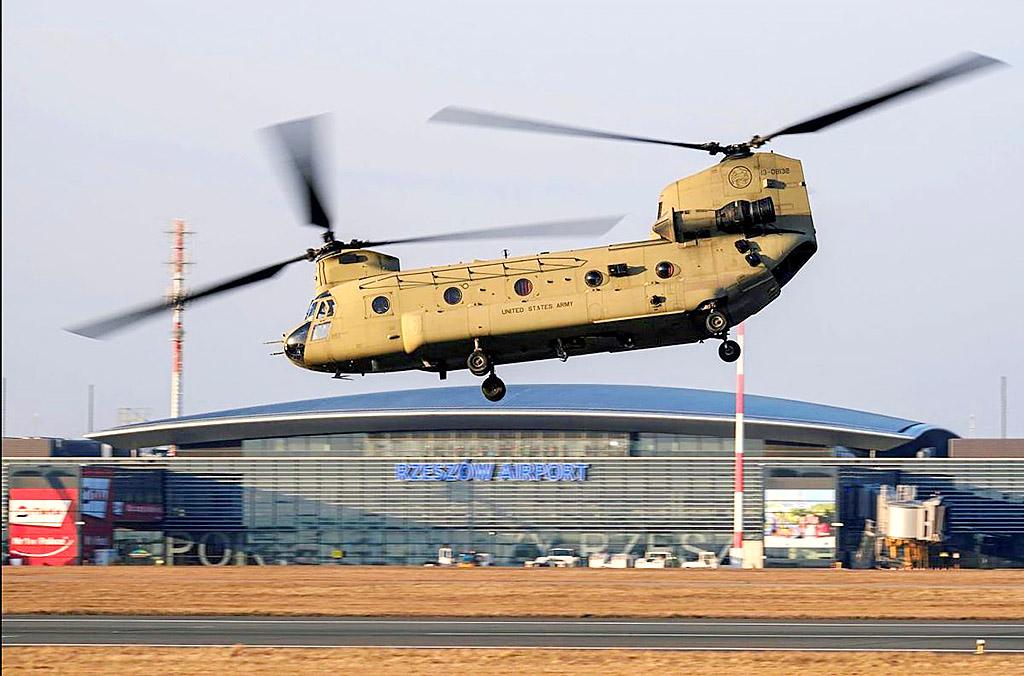Manila is looking to buy heavy-lift Chinook helicopters from the US, after scrapping a deal with Russia worth 12.7 billion pesos (US$227.43 million) to avoid sanctions, Philippine Ambassador to Washington Jose Manuel Romualdez said yesterday.
In June, days before then-Philippine president Rodrigo Duterte ended his six-year term, the Philippines scrapped a deal to buy 16 Mi-17 Russian military transport helicopters because of fears of US sanctions linked to Russia’s invasion of Ukraine.
“This cancellation of this contract is precipitated mainly by the war in Ukraine. While there are sanctions expected to come our way, from the United States and western countries, obviously it is not in our interest to continue and pursue this contract,” Romualdez told journalists in a virtual forum.

Photo: Reuters
Romualdez said the Chinooks would replace existing hardware used for the movement of troops and for disaster preparedness in the Southeast Asian country.
The US is willing to strike a deal for the amount the Philippines was set to spend on the Russian helicopters, Romualdez said, adding that it would likely include maintenance, service and parts.
The Philippines is pursuing discussions with Russia to recover its US$38 million down payment for the helicopters, the delivery of which was supposed to start in November next year, or 24 months after the contract was signed.
The Philippines is at the tail-end of a five-year, 300 billion pesos modernization of its outdated military hardware, which includes warships from World War II and helicopters used by the US in the Vietnam War.
Aside from military deals, the nation, under Philippine President Ferdinand Marcos Jr, also wants increased economic exchanges with the US, in fields such as manufacturing, digital infrastructure and clean energy, including modular nuclear power, Romualdez said.

FREEDOM OF NAVIGATION: The UK would continue to reinforce ties with Taiwan ‘in a wide range of areas’ as a part of a ‘strong unofficial relationship,’ a paper said The UK plans to conduct more freedom of navigation operations in the Taiwan Strait and the South China Sea, British Secretary of State for Foreign, Commonwealth and Development Affairs David Lammy told the British House of Commons on Tuesday. British Member of Parliament Desmond Swayne said that the Royal Navy’s HMS Spey had passed through the Taiwan Strait “in pursuit of vital international freedom of navigation in the South China Sea.” Swayne asked Lammy whether he agreed that it was “proper and lawful” to do so, and if the UK would continue to carry out similar operations. Lammy replied “yes” to both questions. The

‘OF COURSE A COUNTRY’: The president outlined that Taiwan has all the necessary features of a nation, including citizens, land, government and sovereignty President William Lai (賴清德) discussed the meaning of “nation” during a speech in New Taipei City last night, emphasizing that Taiwan is a country as he condemned China’s misinterpretation of UN Resolution 2758. The speech was the first in a series of 10 that Lai is scheduled to give across Taiwan. It is the responsibility of Taiwanese citizens to stand united to defend their national sovereignty, democracy, liberty, way of life and the future of the next generation, Lai said. This is the most important legacy the people of this era could pass on to future generations, he said. Lai went on to discuss

SECOND SPEECH: All political parties should work together to defend democracy, protect Taiwan and resist the CCP, despite their differences, the president said President William Lai (賴清德) yesterday discussed how pro-Taiwan and pro-Republic of China (ROC) groups can agree to maintain solidarity on the issue of protecting Taiwan and resisting the Chinese Communist Party (CCP). The talk, delivered last night at Taoyuan’s Hakka Youth Association, was the second in a series of 10 that Lai is scheduled to give across Taiwan. Citing Taiwanese democracy pioneer Chiang Wei-shui’s (蔣渭水) slogan that solidarity brings strength, Lai said it was a call for political parties to find consensus amid disagreements on behalf of bettering the nation. All political parties should work together to defend democracy, protect Taiwan and resist

By refusing to agree spending increases to appease US President Donald Trump, Spanish Prime Minister Pedro Sanchez threatened to derail a summit that NATO Secretary-General Mark Rutte needs to run smoothly for the sake of the military alliance’s future survival. Ahead of yesterday’s gathering in The Hague, Netherlands, things were going off the rails. European officials have expressed irritation at the spoiler role that Sanchez is playing when their No. 1 task is to line up behind a pledge to raise defense spending to 5 percent of GDP. Rutte needed to keep Spain in line while preventing others such as Slovakia